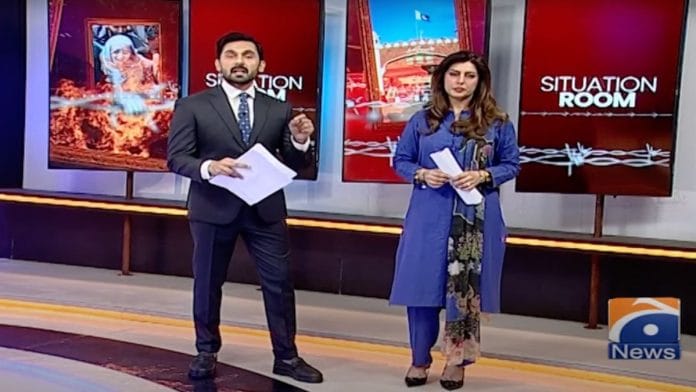New Delhi: Pakistani newsrooms have not only denied the country’s involvement in the 22 April Pahalgam terror attack in Kashmir, but have also turned it into an opportunity to push their age-old narrative about India. From fiery editorials to sarcastic anchors correcting Indian newscasters’ Urdu on air, the mood in Pakistan’s media isn’t just defensive—it’s irreverent, exasperated, and downright unimpressed.
Geo News anchors played clips from Indian news channels and took jabs—not just at the content but at their hosts’ grammar. “It’s not jinda, it’s zinda,” one anchor said, deadpan, before asking viewers, “Do you even take them seriously? If you do, may you all get well soon.”
The anchors then “hoped” that the Indian public is smarter than their media.
‘Ball is in India’s court’
Editorials took a more serious tone. Dawn wrote that the Indian media did not help the matter after the Indian state “jumped the gun by blaming Pakistan for its own security lapses.” The editorial described commentators in Indian TV studios as “armchair warriors baying for Pakistani blood, and banging the drums of war.” It also said that the ball is now in India’s court.
“Much will depend on which path India takes; the one of wisdom and reflection, or the one of jingoism and unending conflict,” the editorial titled New Delhi’s ill-advised route concluded.
An opinion piece in The Express Tribune took a rather insensitive view. Pakistan Army’s Lt Gen Shafaat Ullah Shah (retd) focused on the lack of “visible bloodstains, bullet marks or credible video evidence from the scene or from hospitals.”
“Strong circumstantial evidence suggests the Pahalgam attack may have been orchestrated for political gain. It conveniently followed a string of developments troubling for India—improving Pakistan ties with Afghanistan and Bangladesh, Trump’s renewed engagement with Islamabad, and growing global interest in Pakistan’s rare earth reserves,” Pakistan Army’s Lt Gen Shafaat Ullah Shah (retd) wrote in The Express Tribune.
In fact, Pakistani media is busy speculating the role of Indian intelligence agencies in “financing” the BLA, TTP, and “targeting” Sikhs abroad—in Canada, the US, and the UK.
A grey-zone player getting attention, according to General Shah, is Islamic State-Khorasan Province. He alleged that the IS-K is a proxy of Indian agencies and rogue TTP elements, and has been active in Kashmir.
Political commentator Hasan Zafar said described them as ghosts of Cold War-era policies—funded and encouraged by the US—that still haunt regional discourse. He also accused India of staging a “false flag”.
Political commentator Hasan Zafar said that Indian newsrooms have sought to interpret Army chief General Asim Munir’s recent Kashmir speech as a covert signal to “Pakistani assets” in the region. He argued that militant groups being named by Indian media haven’t been operational in years—their funding, manpower, and leadership are long gone. Zafar said that their name survives only in Indian headlines and TV segments.
The real escalation in Pakistani media, however, came not from India’s action in the battlefield but in diplomatic circles: the suspension of the 1960 Indus Waters Treaty (IWT).
Pakistani officials, including PM coordinator Rana Afzal, called it a threat to the food security of 25 million people.
“This is nothing short of a weaponisation of water,” Afzal said on Geo TV, arguing that the move violates the IWT’s dispute resolution mechanisms.
Geo TV anchors compared India’s actions to Israel’s tactics in Gaza and accused New Delhi of ignoring global norms and humanitarian consequences in favour of high-voltage optics.
A shift in India’s response
While India has leveraged its newfound geopolitical weight—thanks to the Quad, G20, and massive investment deals with Saudi Arabia—Pakistani media sees it differently.
Economist Yousuf Nazar in The Friday Times looked at the evolution of India’s responses—from Congress-era diplomacy to Modi’s punitive aggression. Nazar argued that New Delhi didn’t seek evidence in the Pahalgam attack, and suspended the Indus Waters Treaty, sealed borders, and expelled Pakistani nationals, reflecting a strategy powered by domestic support and global clout.
“During the Pahalgam crisis, this stature was evident: the U.S. urged “restraint” without condemning India’s IWT suspension, while allies like France and Japan remained silent, signalling tacit acceptance of India’s actions. This geopolitical clout, absent during earlier crises, allows Modi to pursue aggressive policies with less fear of international backlash, a luxury unavailable to Vajpayee or Singh,” he wrote.
(Edited by Prashant)






